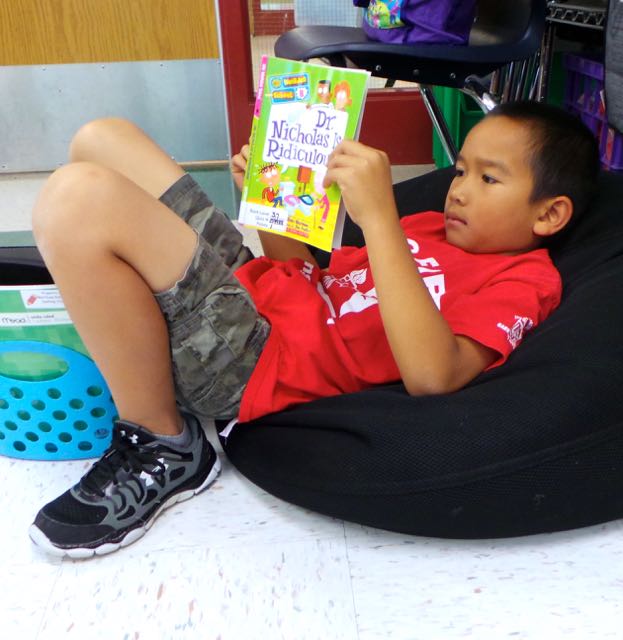Joan Moser
January 16, 2015
Issue #339

I sat down with Dante for a one-on-one reading conference to see how he was progressing with the strategy of cross-checking. He had seemed to have a solid grasp of it the last time we had worked together, and I hoped that he had become even more proficient by practicing during his independent reading time.
It became immediately apparent that instead of cross-checking, Dante had fallen back into his old habit of looking at the first letter of a troublesome word, substituting another word that began with that letter, and continuing to read, whether or not his guess made any sense. When he reached the end of the page, I asked, "What are you thinking?" He looked at me, shrugged, and sat in silence.
He had experienced such success the last time we were together that I felt completely surprised by his lack of proficiency now.
It reminded me of the puppy training I did with our dog last year. I took Cooper to a school that specializes in snake-avoidance training. This is an important skill for dogs that live in Arizona part of the year. I was proud when he passed, but I realized the certificate was merely a piece of paper when that very same evening he went flying off my lap and charged at a rattlesnake that had made its way into our yard.
We can't just presume proficiency because we have taught something and our students demonstrated it once or twice. And we shouldn't succumb to intense pressure to move forward, forgoing assessments that check for acquisition, circling back around to support, and providing extended opportunities to practice and internalize important skills and concepts.
I had jumped to the conclusion that Cooper would be successful on his own. I don't want to make the same mistake in my classroom, and I'm guessing you don't either. So, let's ask ourselves:
- Have I taught in a way that enables my students to apply the skill or concept independently?
- Have I provided enough supported practice?
- Have I circled back to be sure former lessons have stuck, so new learning can be layered on successfully?
If so, we can be sure our students aren't just "passing" but are truly prepared and proficient.
News from The Daily CAFE
 A Desk Makeover
A Desk Makeover
This high-speed video is a fun way to watch a makeover of one teacher's desk space.
 Finding Effective Math Games*
Finding Effective Math Games*
Math Daily 3 uses math games and activities to provide kinesthetic practice of math concepts. Here are some suggestions for where to find these effective and meaningful math games.
 "I Can" Bookmarks*
"I Can" Bookmarks*
Here are the "I Can" bookmarks for Make a picture or mental image and Monitor and fix up.
*Available to members
 b-Resilient
Getting In Your Own Way |
 Conferring with CCPensieve
Edit Class Reading Levels |
Professional Development Opportunities
2015 Live WorkshopsWe are excited about our 2015 workshops. At each location, the first day will focus on Daily 5 and Math Daily 3. Day two covers all things CAFE.
|
2015 Online SeminarsOur online seminars are perfect for those who prefer short bursts of information combined with independent learning. They also work well if you’re time crunched or unable to travel to a live workshop. During each session, we offer a seminar covering Daily 5, CAFE, and Math Daily 3.
Learn more about Daily 5 and CAFE workshops, online seminars, and online graduate courses. |
Up & Running with the Daily 5
Our new how-to video, shot in third-grade and fifth-grade classrooms, is available through subscription for online streaming or as a DVD. Go to Stenhouse Publishers to learn about a limited-time offer that could benefit your school.





